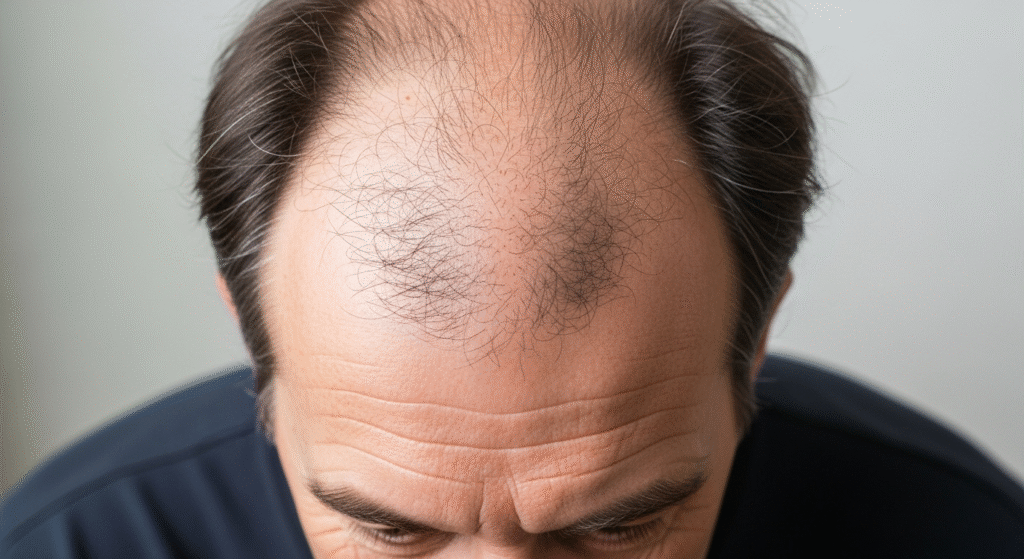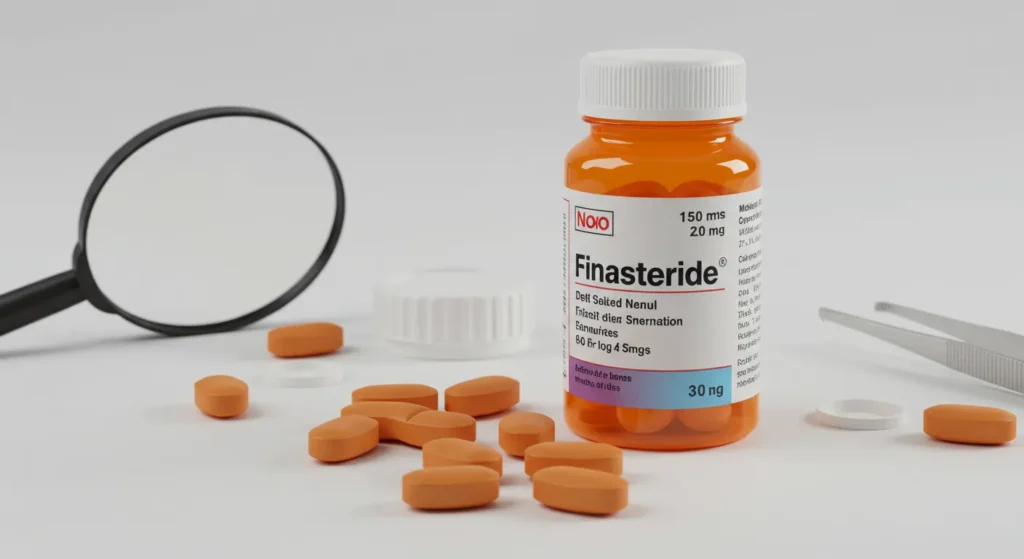Hair loss is frustrating, and if topical treatments haven’t worked, you’re likely searching for stronger solutions. Oral medication for hair loss offers a clinically backed, often more effective alternative.
In this guide, we explore the best oral hair loss medications, what results to expect, their safety, and expert advice. Whether you’re dealing with male pattern baldness or female hormonal shedding, this article helps you understand the pros, cons, and next steps for treatment, backed by medical insights and real-world outcomes.
Understanding Hair Loss: Causes and Patterns

Hair loss can stem from various factors, and identifying the cause is essential before starting any treatment.
Common Types of Hair Loss in Men and Women
- Androgenetic Alopecia (AGA): Also known as male or female pattern baldness, caused by genetics and hormones.
- Telogen Effluvium: Triggered by stress, illness, or hormonal changes.
- Alopecia Areata: An autoimmune condition causing patchy hair loss.
- Traction Alopecia: From tight hairstyles pulling on the roots.
Hormonal, Genetic, and Lifestyle Triggers
- DHT (dihydrotestosterone) sensitivity
- Polycystic ovarian syndrome (PCOS)
- Thyroid disorders
- Nutritional deficiencies
- Chronic stress or trauma
When to Consider Oral Treatment Options
- When hair loss is progressive and topical treatments aren’t effective
- For individuals with widespread thinning
- If the diagnosis confirms hormonal or genetic causes
What Is Oral Medication for Hair Loss?
Oral medications are taken by mouth and work systemically, unlike topical products applied to the scalp.
How Oral Hair Loss Medications Work
Most oral treatments target DHT suppression, hormonal balance, or improved blood circulation to follicles. Some also reduce inflammation or autoimmune activity.
Difference Between Oral and Topical Treatments
| Feature | Oral Medications | Topical Treatments |
|---|---|---|
| Application | Ingested | Applied to scalp |
| Systemic effect | Yes | No |
| Suitability | Advanced or hormonal cases | Mild to moderate cases |
| Compliance | Easier for many | Requires daily effort |
FDA-Approved vs. Off-Label Medications
- Finasteride is FDA-approved for male pattern baldness.
- Spironolactone and oral minoxidil are off-label but increasingly prescribed by dermatologists.
Top Oral Medications for Hair Loss in 2025
Finasteride (Propecia) – DHT Blocker for Men
- How it works: Blocks the 5-alpha reductase enzyme, reducing DHT.
- Dosage: Typically 1 mg daily.
- Results timeline: Visible effects in 3–6 months.
- Side effects: May include reduced libido, erectile dysfunction.

Pro Tip: Finasteride is most effective in early-stage androgenetic alopecia and is not recommended for women.
Dutasteride – A More Potent Alternative
- Inhibits both type I and II 5-alpha reductase enzymes
- Longer half-life than Finasteride
- May offer better results, but slightly higher risk of side effects
- Commonly used off-label with growing clinical support
Spironolactone – For Women with Hormonal Hair Loss
- Blocks androgen receptors and lowers testosterone
- Useful for PCOS-related hair thinning
- Often combined with birth control pills
- Not suitable for pregnant women due to the risk of birth defects
Oral Minoxidil – A Newer Alternative
- Originally, a blood pressure medication
- Now prescribed off-label in low doses for hair growth
- Ideal for patients who can’t tolerate topical minoxidil
- Fewer scalp irritations; side effects include dizziness or water retention
Who Is a Good Candidate for Oral Hair Loss Medications?
Medical Evaluation and Diagnosis
A trichologist or dermatologist will typically perform:
- Scalp examination
- Blood tests (e.g., hormonal panel, thyroid function)
- History of pattern or family-related hair loss
Age, Gender, and Type of Hair Loss
- Finasteride: Adult men with AGA
- Spironolactone: Premenopausal women with hormonal hair loss
- Oral Minoxidil: Suitable for both men and women as a second-line option
When Oral Meds May Not Be Suitable
- Pregnant or breastfeeding women
- Individuals with liver conditions
- Those prone to hormonal imbalances or severe side effects
Real Results: What to Expect from Oral Hair Loss Treatments
Timeline for Seeing Visible Results
- 1–3 months: Reduced shedding
- 4–6 months: New baby hairs may appear
- 6–12 months: Noticeable thickening and coverage
Factors That Affect Outcomes
- Consistency in usage
- Underlying hormonal conditions
- Age and baseline hair density
Potential Side Effects and Safety Considerations
Sexual Side Effects of Finasteride and Dutasteride
- Reduced libido (1–2% of users)
- Erectile dysfunction (rare and often reversible)
Hormonal Risks in Women (e.g., Spironolactone)
- Irregular periods
- Breast tenderness
- Not safe during pregnancy
Monitoring and Long-Term Use
- Blood pressure checks for oral minoxidil
- Hormone levels for long-term spironolactone use
- Liver function tests for Dutasteride users
Combining Oral Meds with Other Treatments
- Oral Minoxidil + PRP therapy = Enhanced regrowth
- Finasteride + FUE Transplant = Long-term retention
Advice for Switching or Stopping Medications
- Tapering under medical supervision
- Use topical alternatives during transitions
- Regular follow-up every 3–6 months

Alternatives to Oral Medication for Hair Loss
Topical Solutions
- Minoxidil 5% foam
- Caffeine-based serums
- Prescription steroid solutions
Procedural Treatments
- PRP (Platelet-Rich Plasma)
- Mesotherapy
- Hair transplants (FUE, FUT)
Lifestyle and Nutritional Adjustments
- Zinc, iron, and biotin supplements
- Stress management (meditation, sleep hygiene)
- Scalp massage and DHT-reducing shampoos
FAQs About Oral Medications for Hair Loss
How long should I take Finasteride or Minoxidil?
Most users need to continue indefinitely to maintain results. Hair regrowth may reverse after stopping.
Can women take oral hair loss meds safely?
Yes, but options are more limited. Spironolactone and oral minoxidil are most common, under close supervision.
Are oral medications better than topical?
They are often more effective in hormonally driven or genetically driven hair loss, especially in men.
Will hair fall resume after stopping the medication?
Yes, discontinuation may result in a gradual loss of regained hair over 3–6 months.
Take Your Next Step
Oral medications can be a game-changer in your hair restoration journey—but only with proper guidance. Book a consultation with Dr. Rana Irfan, ABHRS-Certified Hair Transplant Surgeon in Islamabad, for a comprehensive diagnosis and personalized treatment plan. Let us help you achieve lasting, natural hair regrowth—safely and effectively.
